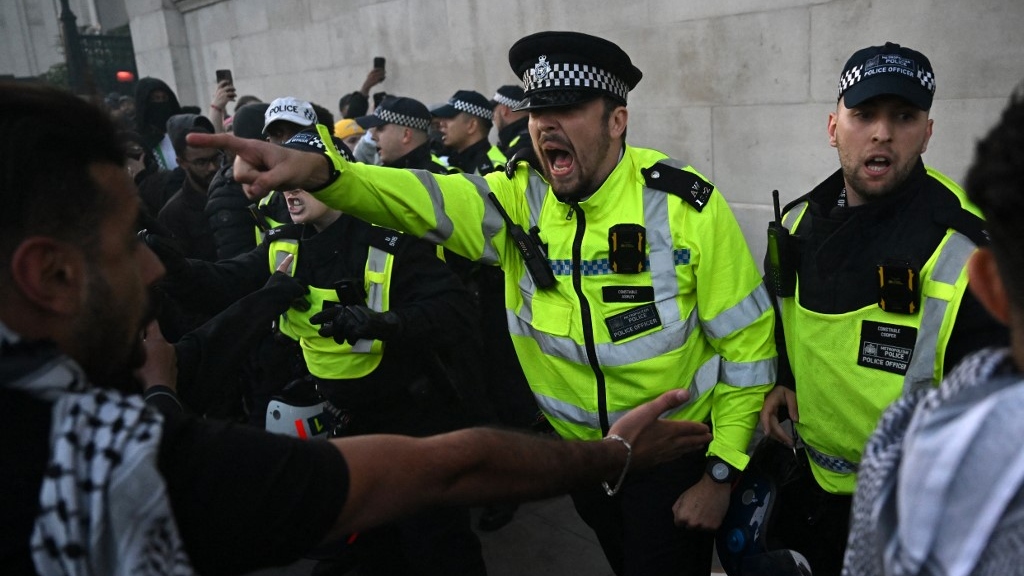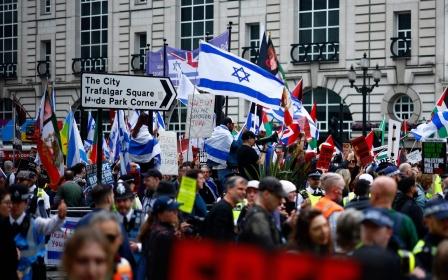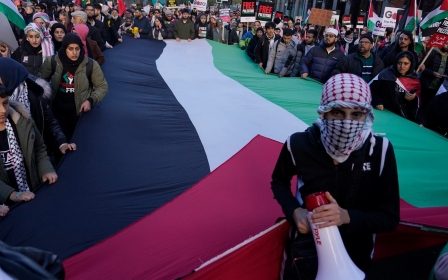Met Police halts discrimination probe into comms chief seconded from UK government
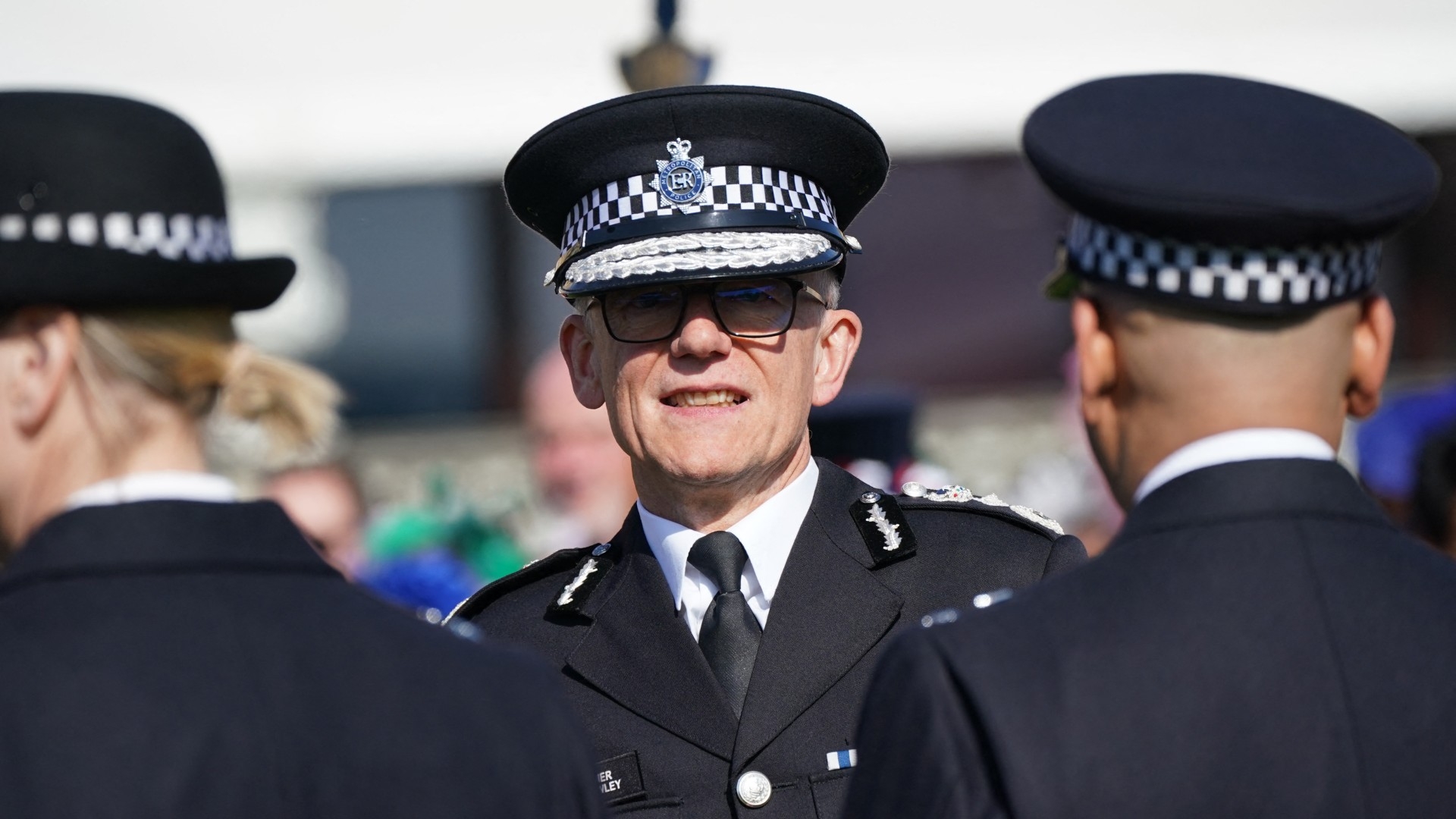
A senior UK government official seconded to the Metropolitan Police faces a complaint of racism over alleged remarks made during a visit to the force’s special operations room by a Muslim advisory group and others invited to observe the policing of a pro-Palestine demonstration in October.
Middle East Eye has learnt that the Met’s own discrimination unit opened an investigation into Sharon Sawers’ conduct after a formal complaint was lodged against her by a member of the visiting group.
Sawers joined the Met as chief communications and engagement officer last September on a two-year secondment from her role as director of communications at the Department for Levelling Up, Housing and Communities (DLUHC).
But MEE understands that investigators recently halted their investigation into the case, which includes allegations that Sawers “demonstrated racist tropes and stereotypes”, because they said they had not been aware she was on secondment.
They now say they cannot investigate the complaints further because Sawers is “not subject to the police misconduct regime” and have instead referred the case to DLUHC.
New MEE newsletter: Jerusalem Dispatch
Sign up to get the latest insights and analysis on Israel-Palestine, alongside Turkey Unpacked and other MEE newsletters
A spokesperson for the Met Police told MEE that two public complaints "regarding alleged incidents of discriminatory behaviour by a member of police staff" had been lodged by one person.
The spokesperson said it was “normal practice” for allegations related to the conduct of police staff on secondment to be “passed to their home organisation”.
“Once that has concluded, we will inform the complainant of the outcome of their complaint against police,” the spokesperson said.
MEE understands that the complaints and statements relating to them have now been sent for review by a senior HR member of staff at DLUHC.
MEE approached Sawers for comment but was told by the Met's press office that she did not wish to engage directly.
The Department for Levelling Up said it did not comment on HR matters but directed MEE to the civil service code which sets out standards of behaviour for government employees.
The case appears to highlight a further critical breakdown in relations between the Met and its own Muslim community advisory group, the London Muslim Community Forum (LMCF), as well as longstanding complaints about institutional racism and discrimination in the force.
According to the police, the role of the LMCF and other community forum groups includes providing strategic and operational advice and giving communities a platform to raise concerns about issues that affect them.
But in November, the Met said it had cut its ties with Attiq Malik, who then chaired the group, after a newspaper reported he had led chants of “From the river to the sea” at a pro-Palestine protest in 2021.
Malik has since stepped back from the group. MEE understands that the LMCF has not formally met with police since then because of concerns among its members about how Malik was identified in the media in apparent breach of police policy not to disclose the names of voluntary advisers.
Malik told MEE: “Trust and confidence has been destroyed. The central ethos of the police is policing by consent, policing with the community and putting the community first. This shows yet again that the police put themselves first and the community second.”
Special operations room
The complaint against Sawers arose after representatives of the LMCF and other community groups were invited to observe the policing operation on the day of the first large pro-Palestinian demonstration in central London on 14 October.
The policing of pro-Palestine protests, one week after the Hamas-led attacks in southern Israel and the launch of Israel’s assault on Gaza, was by then already a politically contentious issue.
Suella Braverman, who was then home secretary, had written to police chiefs in the days before the march to urge them to consider whether the waving of Palestine flags and pro-Palestine chants such as “From the river to the sea” at protests could be public order offences.
In response, the LMCF put out a statement in which it said it had met with police chiefs and been reassured that the flag was not banned and could be displayed.
On the day of the march, the group, which included Malik, was given a tour of the special operations room.
They were joined by two of Braverman’s special advisers and a representative from the Community Security Trust, an organisation that monitors antisemitism, and accompanied by Sawers and a number of police officers.
At the end of the tour, Malik and another person approached Braverman’s special advisers to speak to them. Sawers is alleged to have intervened, commenting “They're not here to be lobbied by you lot”.
Sawers is also alleged to have repeatedly misnamed an Asian police officer accompanying the group, addressing him by the name of another Asian police officer and continuing to do so even after she had been corrected.
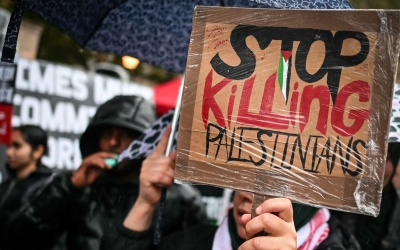
She is alleged to have turned her back on a member of the group who corrected her and to have behaved in a way that was perceived to be “aggressive, sneering and patronising”.
MEE understands that the episode was escalated by senior officers inside the operations room to Met Deputy Commissioner Lynne Owens, the force’s second most senior officer, who came to the room to speak to members of the Muslim group and the officers involved.
Owens is understood to have apologised and said she would speak to Sawers and address it as a “line management” issue.
But the case was referred to the Met’s internal Directorate of Professional Standards (DPS) at the end of November over concerns that nothing further appeared to have been done.
The DPS then opened a formal investigation through its discrimination investigation unit which took statements from witnesses including a number of police officers.
Malik, who was among those who provided a witness statement, called on the Met to suspend Sawers' secondment and criticised the length of time that police investigators had spent dealing with the matter.
He said: “Are they seriously saying it took them eight months to realise she is on secondment and they can’t investigate it? They have dragged this claim of discrimination out and now we are told they cannot do anything."
'An anti-discrimination organisation'
Andy George, president of the National Black Police Association (NBPA), which represents officers from Black and Minority Ethnic communities, told MEE: "We are deeply concerned on learning that someone in such a senior position within the MPS [Metropolitan Police Service] is alleged to have acted in a discriminatory manner at such a highly emotive time for communities in London and around the world.
“We are even more concerned that someone on a secondment and holding such a senior role is not able to be held to account through the same processes as other MPS employees.”
The case appears to raise further questions about the Met’s commitment to addressing the findings of a review last year by Dame Louise Casey which accused the force of “institutional racism, misogyny and homophobia”.
Following that, Met Commissioner Mark Rowley in September launched an action plan called “A New Met for London”, which pledged to transform the force into “an anti-discrimination organisation” and vowed to make “cultural change a priority for everyone, driven by senior leaders”.
Sawers currently sits alongside Rowley, Owens and other senior staff on the Metropolitan Police’s management board, which sets the strategic direction of the force.
George said NBPA members had recently seen “an apparent pushback on cries for urgent reform from Black, Asian and Minority Ethnic communities”, citing an increase in the number of misconduct cases brought against Black officers.
“The NBPA believe that the MPS have had many chances to reform but failed or refused to do so. It must be broken up as it is too big and its culture has gone too far to reform on the scale which is required right now.”
A Met spokesperson said: “Our ambition is to be anti-discrimination in any form and we are determined to build a Met that represents all we serve and is a place where everyone can thrive.”
"We know policing is best when we understand the perspectives of all those affected and we continue to develop how we work with all London's communities."
Middle East Eye delivers independent and unrivalled coverage and analysis of the Middle East, North Africa and beyond. To learn more about republishing this content and the associated fees, please fill out this form. More about MEE can be found here.


